Meagan Kaiser didn’t grow up on a farm.
But?
“I jokingly say I grew up on everybody else’s farm,” she smiles as she chats over a video call from Missouri in the USA.
It obviously stood to her. Because fast forward to today and, not only is Meagan a soil scientist and entrepreneur who farms soya beans and corn in partnership with her husband, she is also the current chair of the United Soybean Board, representing over half a million soya bean farmers across the country.
Which is why you might find her on a Zoom panel with US vice president Kamala Harris discussing rural broadband, analysing soil samples, or helping her son prepare for his first-grade spelling test.
“And my two-year-old, making sure we have enough bananas in the pantry to keep her satisfied,” she laughs.
Planting the seed
But where did it all start?
Well, you could go back to 1982, when Meagan’s parents established Perry Agricultural Lab in Bowling Green, Missouri – or a bit later, when she received a very memorable birthday present.
“When I was nine, my dad got a go-kart for my birthday and he put one of the very first GPS systems on top of it,” she recalls of what she knows now was early precision agricultural technology. “He would let me run around other people’s fields.”
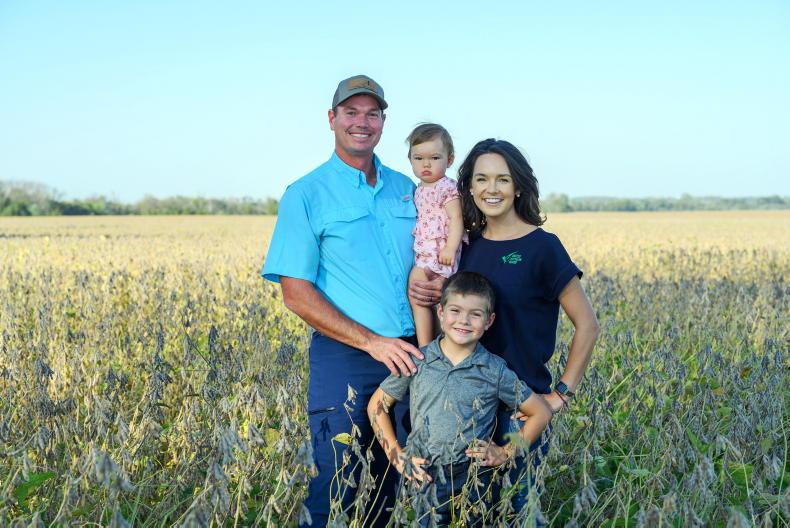
Meagan Kaiser with her husband Marc, son Mak and daughter Norah. \ United Soybean Board
At 16, Meagan decided she wanted to be a soil scientist after accompanying her father on a business trip to the UK, explaining that what really resonated with her was “the very humanitarian imperative of efficient agricultural production to feed people”.
This led her to study soil science, chemistry and agri-economics ?at the University of Missouri, Columbia, where she also became involved with the Food And Agriculture Policy Research Institute (FAPRI).
Little wonder then that one of her first jobs after graduation was in Washington DC as a legislative assistant, where she quips that she earned her “?PhD in human interaction”.
“It really is not about what you say, but how you say it sometimes, and it taught me a lot about shared goals,” she expands.
“So, often we hear people say: ‘We just need to educate other people.’ And honestly, I come at it more as a: ‘We need to find what our shared vision is together.’”
Soil and soya beans
All of these lessons are ones that Meagan draws on in her various roles today.
Her “day job” is as chief operations officer (COO) at the family lab, which today tests soil samples from 75 countries around the world and has expanded to include agri-technology to offer farmers precision sampling, testing and prescriptions to meet production, environmental and regulatory challenges.
Meagan feels that beyond the lab, however, the wider public is starting to appreciate the importance of soil health (“it’s more like gut health than pure chemistry”) and that this is an important message for farmers to communicate to consumers.
“When they hear that farmers are taking care of their soil, they feel better about buying our product because they feel like we are being holistic about it,” she expands.
“The consumer ultimately says: ‘You know, I feel better about the nutrition in my bell pepper or my potato because I know it was grown using science.”
But Meagan not only preaches it, she practices it. Along with her husband Marc – a fifth-generation farmer – the couple grow soya beans and corn in crop rotation on 4,500 acres beside the Missouri river. Though, with weather challenges, ensuring that they have a “resilient crop” is a top priority.
“In 2019, flood was an issue – we lost our entire crop,” states Meagan as one example.
“These things happen, but what farmers do is buffer ourselves as much as possible by really caring for our soil and making all the right decisions throughout the growing season that we can to make sure that we have a resilient crop.”
United Soybean Board
For the last seven years, Meagan has also played an active role on the United Soybean Board, which represents 515,000 soya bean farmers across the US.
Each one of those farmers pays .5 of 1% of every bushel of soy that they sell into what is known as the “check off”. This in turns funds the work of the United Soybean Board, which is led by 77 appointed farmer leaders, who work to create increased demand – and a better bottom line – for US soya bean farmers; be that through research or finding new markets for soy meal and oil at home and abroad.
For instance, the board has worked with companies like Goodyear Tyres and Skechers shoes to incorporate soy into their rubber technology. They have also invested in production research in soya bean flower and pod retention – increasing yield potential of 10%-15% or $50 per acre – and also collaborated with US fleets to incorporate bio-based products, like bio-diesel, into their vehicles and equipment.
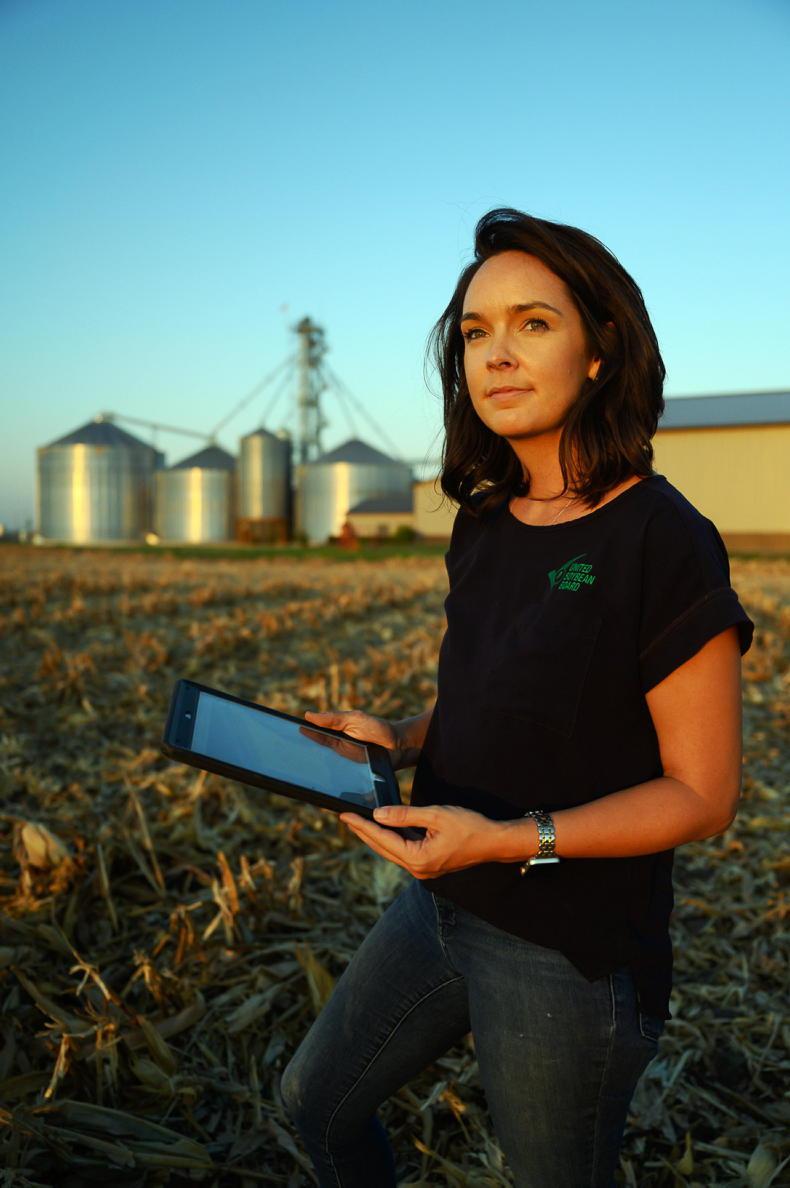
Meagan took part in a Zoom panel discussion with Vice-President Kamala Harris on limited broadband access. \ United Soybean Board
For Meagan, such initiatives are proof of what can be achieved when farmers come together to “make an impact that’s greater than any one of us could ever imagine making.”
“I really feel like, in a commodity market, farmers are often price takers – we have to react to the situations the world gives us. At the board, we don’t do that,” she continues.
“We get to write our own destiny and we get to make a stronger proposition for all US soy farmers and so, for me, it’s very rewarding to be part of something that’s bigger than ourselves.”
Female farm leadership
Prior to being elected as chair in 2022, Meagan had fulfilled a number of other roles, including treasurer and vice chair. We ask if it’s unusual to have a female in the top role?
“Statistically yes, it’s unusual. I’m only the second female chair and I remember somebody telling me when I first got on the board (and this came from a woman): ‘Oh, we never have more than two women on the executive committee.’ Well, we now have four and I think, in fact, if you look, we have 12 women on our board of 77. Statistically that might actually be over representation if you look at female ownership of farms,” she responds, adding that she personally has never faced any discrimination based on gender.
“So, I think it really gives me a lot of hope that in agriculture, the biggest message is: ‘You’re welcome here,’” she continues.
“I think in agriculture, we look for smart, talented, hard-working people and what you look like or your gender doesn’t matter as much as you being the most qualified person here.”
Beyond the farm gate
Her influence, however, has been recognised outside the board. In March, she received a 2023 Women of Achievement award from the Office of Missouri’s lieutenant governor, while in 2021, she was invited by the White House to participate in a Zoom panel discussion about limited broadband with vice-president Kamala Harris.
“Immediately, I was thinking: ‘Where can I take this Zoom call to make sure I don’t lose connection while I’m talking to the vice president of the United States?’” she laughs of the irony of the situation, but says that what really struck her was the fact that every person on the call was facing the same problem, whether they were urban or rural.
“In some ways, I think in agriculture we’re so off by ourselves a little bit that we feel that nobody cares because nobody has this problem like we do, so that was an interesting, eye-opening experience for me,” she continues.
“Don’t think like that. Don’t assume nobody else has the same problem – you’re going to have to reach out past your farm gate to build a coalition [to deal with it].”
One last question then: what encouragement would she like to share with women in agriculture in Ireland who might be interested in taking a step towards a farm leadership role?
“The thing that I always lean back on is don’t be afraid of working hard. And I don’t do everything all the time and I never think I’ve done anything perfectly, but sometimes you have to lean into it a little bit and push yourself,” she stresses.
“But the rewards of knowing that you’ve made an impact beyond your own farm gate, I find that incredibly fulfilling. I think, especially for women, you can be a great role model for your daughters and your sons if you show that you live beyond just your family and your farm, that you can get out there and make a difference to others.”
For further information, visit https://www.unitedsoya bean.org/
Read more
International farm series: from beef to bugs in Wales
Meet Illinois journalist and corn, soya bean and beef farmer Holly Spangler
Meagan Kaiser didn’t grow up on a farm.
But?
“I jokingly say I grew up on everybody else’s farm,” she smiles as she chats over a video call from Missouri in the USA.
It obviously stood to her. Because fast forward to today and, not only is Meagan a soil scientist and entrepreneur who farms soya beans and corn in partnership with her husband, she is also the current chair of the United Soybean Board, representing over half a million soya bean farmers across the country.
Which is why you might find her on a Zoom panel with US vice president Kamala Harris discussing rural broadband, analysing soil samples, or helping her son prepare for his first-grade spelling test.
“And my two-year-old, making sure we have enough bananas in the pantry to keep her satisfied,” she laughs.
Planting the seed
But where did it all start?
Well, you could go back to 1982, when Meagan’s parents established Perry Agricultural Lab in Bowling Green, Missouri – or a bit later, when she received a very memorable birthday present.
“When I was nine, my dad got a go-kart for my birthday and he put one of the very first GPS systems on top of it,” she recalls of what she knows now was early precision agricultural technology. “He would let me run around other people’s fields.”

Meagan Kaiser with her husband Marc, son Mak and daughter Norah. \ United Soybean Board
At 16, Meagan decided she wanted to be a soil scientist after accompanying her father on a business trip to the UK, explaining that what really resonated with her was “the very humanitarian imperative of efficient agricultural production to feed people”.
This led her to study soil science, chemistry and agri-economics ?at the University of Missouri, Columbia, where she also became involved with the Food And Agriculture Policy Research Institute (FAPRI).
Little wonder then that one of her first jobs after graduation was in Washington DC as a legislative assistant, where she quips that she earned her “?PhD in human interaction”.
“It really is not about what you say, but how you say it sometimes, and it taught me a lot about shared goals,” she expands.
“So, often we hear people say: ‘We just need to educate other people.’ And honestly, I come at it more as a: ‘We need to find what our shared vision is together.’”
Soil and soya beans
All of these lessons are ones that Meagan draws on in her various roles today.
Her “day job” is as chief operations officer (COO) at the family lab, which today tests soil samples from 75 countries around the world and has expanded to include agri-technology to offer farmers precision sampling, testing and prescriptions to meet production, environmental and regulatory challenges.
Meagan feels that beyond the lab, however, the wider public is starting to appreciate the importance of soil health (“it’s more like gut health than pure chemistry”) and that this is an important message for farmers to communicate to consumers.
“When they hear that farmers are taking care of their soil, they feel better about buying our product because they feel like we are being holistic about it,” she expands.
“The consumer ultimately says: ‘You know, I feel better about the nutrition in my bell pepper or my potato because I know it was grown using science.”
But Meagan not only preaches it, she practices it. Along with her husband Marc – a fifth-generation farmer – the couple grow soya beans and corn in crop rotation on 4,500 acres beside the Missouri river. Though, with weather challenges, ensuring that they have a “resilient crop” is a top priority.
“In 2019, flood was an issue – we lost our entire crop,” states Meagan as one example.
“These things happen, but what farmers do is buffer ourselves as much as possible by really caring for our soil and making all the right decisions throughout the growing season that we can to make sure that we have a resilient crop.”
United Soybean Board
For the last seven years, Meagan has also played an active role on the United Soybean Board, which represents 515,000 soya bean farmers across the US.
Each one of those farmers pays .5 of 1% of every bushel of soy that they sell into what is known as the “check off”. This in turns funds the work of the United Soybean Board, which is led by 77 appointed farmer leaders, who work to create increased demand – and a better bottom line – for US soya bean farmers; be that through research or finding new markets for soy meal and oil at home and abroad.
For instance, the board has worked with companies like Goodyear Tyres and Skechers shoes to incorporate soy into their rubber technology. They have also invested in production research in soya bean flower and pod retention – increasing yield potential of 10%-15% or $50 per acre – and also collaborated with US fleets to incorporate bio-based products, like bio-diesel, into their vehicles and equipment.

Meagan took part in a Zoom panel discussion with Vice-President Kamala Harris on limited broadband access. \ United Soybean Board
For Meagan, such initiatives are proof of what can be achieved when farmers come together to “make an impact that’s greater than any one of us could ever imagine making.”
“I really feel like, in a commodity market, farmers are often price takers – we have to react to the situations the world gives us. At the board, we don’t do that,” she continues.
“We get to write our own destiny and we get to make a stronger proposition for all US soy farmers and so, for me, it’s very rewarding to be part of something that’s bigger than ourselves.”
Female farm leadership
Prior to being elected as chair in 2022, Meagan had fulfilled a number of other roles, including treasurer and vice chair. We ask if it’s unusual to have a female in the top role?
“Statistically yes, it’s unusual. I’m only the second female chair and I remember somebody telling me when I first got on the board (and this came from a woman): ‘Oh, we never have more than two women on the executive committee.’ Well, we now have four and I think, in fact, if you look, we have 12 women on our board of 77. Statistically that might actually be over representation if you look at female ownership of farms,” she responds, adding that she personally has never faced any discrimination based on gender.
“So, I think it really gives me a lot of hope that in agriculture, the biggest message is: ‘You’re welcome here,’” she continues.
“I think in agriculture, we look for smart, talented, hard-working people and what you look like or your gender doesn’t matter as much as you being the most qualified person here.”
Beyond the farm gate
Her influence, however, has been recognised outside the board. In March, she received a 2023 Women of Achievement award from the Office of Missouri’s lieutenant governor, while in 2021, she was invited by the White House to participate in a Zoom panel discussion about limited broadband with vice-president Kamala Harris.
“Immediately, I was thinking: ‘Where can I take this Zoom call to make sure I don’t lose connection while I’m talking to the vice president of the United States?’” she laughs of the irony of the situation, but says that what really struck her was the fact that every person on the call was facing the same problem, whether they were urban or rural.
“In some ways, I think in agriculture we’re so off by ourselves a little bit that we feel that nobody cares because nobody has this problem like we do, so that was an interesting, eye-opening experience for me,” she continues.
“Don’t think like that. Don’t assume nobody else has the same problem – you’re going to have to reach out past your farm gate to build a coalition [to deal with it].”
One last question then: what encouragement would she like to share with women in agriculture in Ireland who might be interested in taking a step towards a farm leadership role?
“The thing that I always lean back on is don’t be afraid of working hard. And I don’t do everything all the time and I never think I’ve done anything perfectly, but sometimes you have to lean into it a little bit and push yourself,” she stresses.
“But the rewards of knowing that you’ve made an impact beyond your own farm gate, I find that incredibly fulfilling. I think, especially for women, you can be a great role model for your daughters and your sons if you show that you live beyond just your family and your farm, that you can get out there and make a difference to others.”
For further information, visit https://www.unitedsoya bean.org/
Read more
International farm series: from beef to bugs in Wales
Meet Illinois journalist and corn, soya bean and beef farmer Holly Spangler







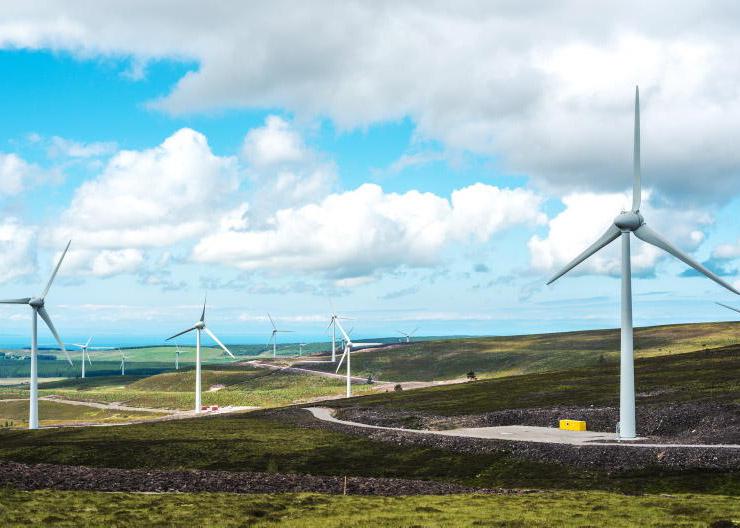

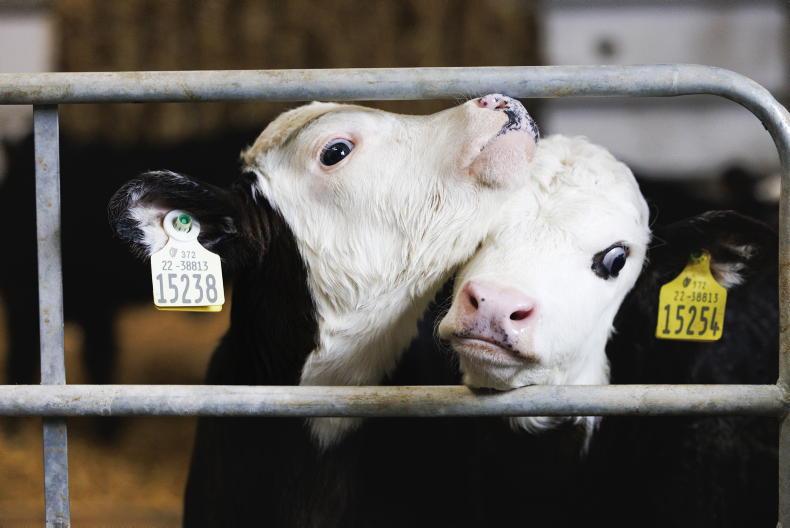
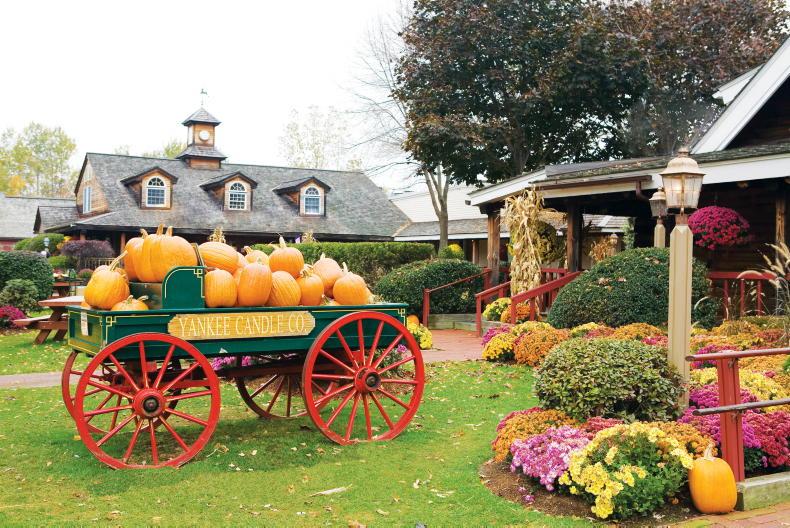
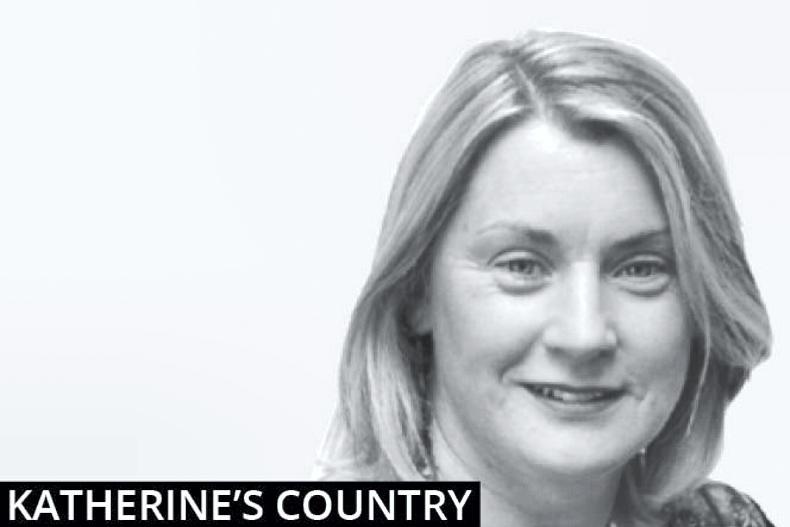
SHARING OPTIONS